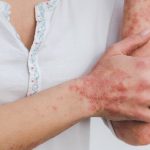Angular Cheilitis is a common condition that affects the corners of the mouth. It is characterized by painful cracks or splits in the skin, redness, and inflammation. While it may seem like a minor issue, it can be quite uncomfortable and even embarrassing for those who suffer from it.
Understanding the causes, symptoms, and treatment options for Angular Cheilitis is important for anyone who wants to prevent or manage this condition.
What is Angular Cheilitis?
 Angular Cheilitis, also known as perleche or angular stomatitis, is a condition that affects the corners of the mouth. It is characterized by painful cracks or splits in the skin, redness, and inflammation. The condition can affect one or both corners of the mouth and can be caused by a variety of factors.
Angular Cheilitis, also known as perleche or angular stomatitis, is a condition that affects the corners of the mouth. It is characterized by painful cracks or splits in the skin, redness, and inflammation. The condition can affect one or both corners of the mouth and can be caused by a variety of factors.
The skin around the mouth is delicate and sensitive, which makes it more susceptible to irritation and infection. When the skin becomes dry or chapped, it can crack and split, creating an opening for bacteria or fungi to enter. This can lead to an infection that causes inflammation and pain.
Causes of Angular Cheilitis
There are several factors that can contribute to the development of Angular Cheilitis. These include bacterial or fungal infections, nutritional deficiencies, allergies, and medical conditions.
Bacterial or fungal infections are one of the most common causes of Angular Cheilitis. These infections can occur when there is an overgrowth of bacteria or fungi in the mouth or on the skin around the mouth. This can happen when there is an imbalance in the natural flora of the mouth or when there is damage to the skin.
Nutritional deficiencies can also contribute to the development of Angular Cheilitis. A lack of certain vitamins and minerals, such as iron, zinc, and B vitamins, can weaken the immune system and make it more difficult for the body to fight off infections.
Allergies to certain foods or products can also cause Angular Cheilitis. Some people may be allergic to ingredients in toothpaste, lip balm, or other products that come into contact with the skin around the mouth.
Medical conditions such as diabetes, HIV/AIDS, and autoimmune disorders can also increase the risk of developing Angular Cheilitis. These conditions can weaken the immune system and make it more difficult for the body to fight off infections.
Symptoms of Angular Cheilitis
The symptoms of Angular Cheilitis can vary from person to person, but some common signs include:
– Cracks or splits in the corners of the mouth
– Pain or discomfort when opening the mouth
– Redness or inflammation
– Dryness or scaling
– Itching or burning sensation
In severe cases, the skin around the mouth may become swollen and infected, which can cause pus to form.
Treatment Options for Angular Cheilitis
There are several treatment options available for Angular Cheilitis. The choice of treatment will depend on the underlying cause of the condition.
Topical creams or ointments can be used to soothe and heal the skin around the mouth. These products may contain antifungal or antibacterial agents that can help to eliminate any infection that may be present.
Antifungal or antibacterial medications may also be prescribed by a doctor if the infection is severe or persistent. These medications are usually taken orally and can help to eliminate any bacteria or fungi that may be causing the condition.
Nutritional supplements such as iron, zinc, and B vitamins may be recommended if a deficiency is suspected. These supplements can help to strengthen the immune system and promote healing.
Home remedies such as applying honey, coconut oil, or aloe vera gel to the affected area may also provide relief from symptoms.
Can Angular Cheilitis Disappear on Its Own?
In some cases, Angular Cheilitis may disappear on its own without treatment. However, this is not always the case. The healing process can be affected by several factors, including the severity of the infection, the underlying cause of the condition, and the overall health of the individual.
If left untreated, Angular Cheilitis can become more severe and lead to complications such as secondary infections or scarring.
Preventing Angular Cheilitis
Preventing Angular Cheilitis involves maintaining good oral hygiene, avoiding irritants or allergens, and eating a balanced diet.
Good oral hygiene includes brushing and flossing regularly, using a mouthwash to kill bacteria, and avoiding sharing utensils or other items that come into contact with the mouth.
Avoiding irritants or allergens involves identifying and avoiding any products that may be causing an allergic reaction or irritation. This may include toothpaste, lip balm, or other products that come into contact with the skin around the mouth.
Eating a balanced diet that is rich in vitamins and minerals can help to strengthen the immune system and promote healing.
When to See a Doctor for Angular Cheilitis
It is important to see a doctor if you experience severe or persistent symptoms of Angular Cheilitis. Signs of infection such as pus or fever should also be evaluated by a medical professional.
Underlying medical conditions such as diabetes or autoimmune disorders may require additional treatment to manage Angular Cheilitis effectively.
Angular Cheilitis is a common condition that affects the corners of the mouth. It can be caused by bacterial or fungal infections, nutritional deficiencies, allergies, or medical conditions. Symptoms include cracks or splits in the corners of the mouth, pain or discomfort when opening the mouth, redness or inflammation, dryness or scaling, and itching or burning sensation.
Treatment options include topical creams or ointments, antifungal or antibacterial medications, nutritional supplements, and home remedies. Preventing Angular Cheilitis involves maintaining good oral hygiene, avoiding irritants or allergens, and eating a balanced diet.
If you experience severe or persistent symptoms of Angular Cheilitis, it is important to see a doctor for evaluation and treatment. Seeking medical advice can help to prevent complications and promote healing.









